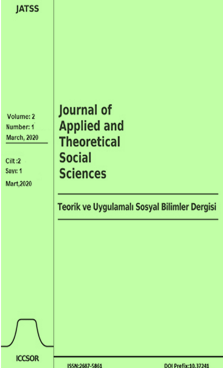Industry 4.0 And Flexible Business Interaction In Entrepreneurship Activities: Ballipinar Farm
Abstract
The most important characteristics of the successful attempts adapt to their environment are; in practice, it is possible to say that they prefer flexible business understanding. It is also possible to state that enterprises can maintain their existence for a long time in economic life. Flexibility is seen as a key to miracle, as a detail that strengthens the position of enterprises, makes it strong among its competitors, and contributes to its development and growth through innovation. In this context, the pros and cons of the flexible business model interaction with the 4th Industrial Revolution called Industry 4.0 comes into question.
The aim of the study is to raise awareness on the subject by evaluating the results of the interaction of Industry 4.0 with the flexible business model, which provides an important advantage for entrepreneurs' initiatives. In this context, a qualitative study was conducted and the views of esnek Ballıpınar Farm olan which is a flexible initiative on the perspective of Industry 4.0 were examined. As a result, entrepreneurs; their initiatives to adapt to emerging industrial revolutions and developing environmental conditions; It is seen that it is possible to reach the opinion that flexible business applications in their structuring can be effective.
Metrics
References
Aktop, S. ve S. Aktop, (2017). “Gıda Endüstrisinde Akıllı Üretim Dönemi ve Endüstri 4.0”, I.Tarım ve Gıda Etiği Kongresi, Sözlü Bildiriler Kitabı, ss.135-141.
Altunışık, R., Coşkun, R., Bayraktaroğlu, S., Yıldırım, E. (2012). Araştırma Yöntemleri, Geliştirilmiş 7.Baskı, Sakarya Yayıncılık, İstanbul.
Aydeniz, N. (1997). “Geleneksel Atölye Üretimleri ile Grup Teknolojisinin Benzeşimli Karşılaştırılması Üzerine Bir Deneme”, Adana: Çukurova Üniversitesi, İktisadi ve İdari Bilimler Fakültesi Dergisi, Cilt:7, Sayı:1.
Aytaç, Ö. ve İ. Süleyman. (2007)“Girişimcilik ve Girişimci Kültür: Sosyolojik Bir Perspektif” Selçuk Üniversitesi Sosyal Bilimler Enstitüsü Dergisi Sayı 18:101-121
Ballıpınar Çiftliği, (2017). http://ballipinarciftligi.com/dogallik-dogalarinda-var/. Erişim tarihi; 03.06.2018.
Cansız, M. (2017). 2023’e Doğru Türkiye Teknoparkları, T.C. Kalkınma Bakanlığı Yayın No:2972, Sosyal Sektörler ve Koordinasyon Genel Müdürlüğü.
Cansız, M. ve Ulusoy, D. (2017). “Teknoloji Tabanlı Girişimcilerin Başarısında Yapısal, Ekonomik, Sosyal, Kültürel ve Beşeri Sermayenin Etkileri: Türkiye Örneği”. Sosyoloji Konferansları, c. 56, s. 113-149.
Cemalcılar, İ. vd. (2000). İşletmecilik Bilgisi, İşitme Özürlü Çocuklar Eğitim ve Araştırma Vakfı Yayın No:3, Eskişehir.
Drucker, P. (2017). İnovasyon ve Girişimcilik Uygulama ve İlkeler, Çev: İ.Gülfidan, Optimist Yayınları, İstanbul.
Ercan, T ve Kutay, M. (2016). “Endüstride Nesnelerin İnterneti (loT) Uygulamaları”. AKU J. Sci. Eng. 16 (2016) 035102 (599-607). DOI: https://doi.org/10.5578/fmbd.43411
Ergen, M. (2014). Girişimci Kapital Silikon Vadisi Tarihi ve Startup Ekonomisi, Koç Üniversitesi Yayınları, İstanbul.
Halıcı, E. (2008). “Girişimcilik ve Teknoparklar: Girişimciliğin Eski ve Yeni Yüzü”, http://www.emo.org.tr/ekler/1f860e3b7f548ab_ek.pdf, Erişim Tarihi:21.05.2018.
Kagermann, H.,Wahlster, W. Ve Helbig, J. (2013). „Recommendations for Implementing the Strategic Initiative Industrie 4.0” Final Report of the Industrie 4.0 Working Group, http://alvarestech.com/temp/tcn/CyberPhysicalSystems-Industrial4-0.pdf, Erişim Tarihi: 03.03.2019.
Karagül, M. (2010). Tehdit ve Fırsatlarıyla Dünya Ekonomisi, Nobel Yayınları, Ankara.
Marangoz, M. (2012). Girişimcilik, Beta Yayınları, İstanbul.
Marangoz, M. (2016). Girişimcilik, Genişletilmiş ve Güncellenmiş 3.Baskı, Beta Yayınları, İstanbul.
Marangoz, M. (2014). İnternette Pazarlama, Beta Yayınları, İstanbul.
Meydanoğlu, E.S.B. ve Klein M. (2016). “Nesnelerin İnterneti ve Pazarlama”, Akıllı Teknoloji&Akıllı Yönetim, Ed. V. Tecim, Ç. Tarhan ve C. Aydın, Gülermat Matbaa, İzmir, ss.12-19.
Özdoğan, O. (2017). Endüstri 4.0 Dördüncü Sanayi Devrimi ve Endüstriyel Dönüşümün Anahtarları, Pusula Yayıncılık, İstanbul.
Özkaşıkçı, I. (2013). Dijital Çağ’da Girişimcilik Ekosistemi, İstanbul, Butik Yayıncılık.
Scarborough, N.M. (2014). Girişimciliğin ve Küçük İşletme Yönetiminin Temelleri, (Çev. Sart, G.), 7.Basımdan çeviri, Ankara: Nobel Yayınları.
Sethi, A.K. ve S.P.Sethi. (1990). “Flexibility in Manufacturing: A.Survey”, International Journal of Flexible Manufacturing Systems, 2/4, ss.289-328. DOI: https://doi.org/10.1007/BF00186471
Soylu, A. (2018). "Endüstri 4.0 ve Girişimcilikte Yeni Yaklaşımlar", Pamukkale Üniversitesi Sosyal Bililmler Enstitüsü Dergisi, sayı 32, Denizli, s.43-57. DOI: https://doi.org/10.30794/pausbed.424955
Tekin, M. Ve M. Zerenler. (2007). Esnek İşletme, Nobel Yayın No:1105.
Top, A. (1996). Üretim Sistemleri, Analiz ve Planlaması, Alfa Yayınları, İstanbul.
Yıldırım A., Şimşek H. (2006). “Sosyal Bilimlerde Nitel Araştırma Yöntemleri”. 5. Baskı, Seçkin Yayınları, Ankara.
Yıldırım, A. ve Şimşek, H. (2016). Sosyal Bilimlerde Nitel Araştırma Yöntemleri, Genişletilmiş 10. Baskı, Seçkin Yayınları, Ankara.
Yuksel, A.N. ve E. Sener (2017). “The reflections of digitalization at organizational level: industry 4.0 in Turkey”. Journal of Business,Economics and Finance (JBEF), V.6, Iss.3, p.291-300. DOI: https://doi.org/10.17261/Pressacademia.2017.688
Zhao, J.C., Zhang, J.F., Feng, Y., Guo,J.X., 2010. The Study and Application of the lOT Technology in Agriculture. 3rd IEEE International Conference on Computer Science and Information Technology (ICCSIT), 462- 465.






















